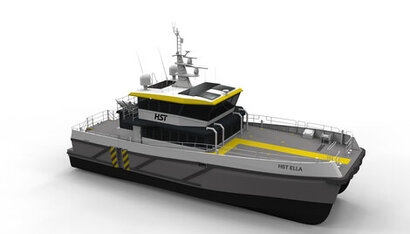
This is according to the Workboat Association (WA), the trade, skills and safety standards association for the workboat industry, and pioneer in next-generation vessel design, Chartwell Marine.
Continued momentum towards decarbonisation in sectors such as offshore wind has driven widespread innovation in the maritime supply chain, as vessel designers and operators gear up to meet stringent emissions requirements and green targets for customers.
SMEs are particularly well placed to incubate new ideas and concepts to bring solutions to the market. Having launched a new Technical Working Group in 2019, which aims to accelerate the decarbonisation of the workboat sector in line with the Clean Maritime Plan, the Workboat Association has hailed a number of significant milestones achieved by its members.
In recent months, members of this Technical Working Group have been responsible for a number of market firsts in the arena of vessel hybridisation, alternative fuels and performance optimisation, including:
Offshore Energy Support Vessel (OESV) operator Seacat Services is using a growing fleet of Chartwell 24 catamarans equipped with BAR Technologies’ foil optimised stability system (FOSS) to reduce fuel consumption and improve comfort for crew and passengers. Seacat has also placed an order for two BARTech 30 CTVs to further increase the versatility of its fleet and enable 30 percent emissions savings.
John Spencer of GPS Marine Contractors, promoter of innovative cost-effective solutions with 50-years of service to the maritime industry, has converted one of his Tug vessels to run on Hydrogenated Vegetable Oil (HVO) and has purchased a Tanker vessel ready to supply the Thames Marine community with HVO.
Chartwell Marine has designed and brought to market several vessels with hull forms optimised for efficiency running hybrid diesel-electric drivetrains. Chartwell’s hybrid Chartwell 24 CTV design also won recognition for High Speed Transfers in Maritime UK’s innovation award.
Manor Marine, ship building and general marine engineering specialists, has built the ‘Hybrid, Manor Endurance’ for Manor Renewables using a hybrid-electric on-board system.
Leo Hambro of Tidal Transit, which provide access, transport and crew transfer services to the industries of the North Sea, has declared his intention to own & operate the world’s first fully electric CTV. Additionally, through Tidal Transit’s joint venture with Louis Dreyfus Armateurs and LD Tide, it is building 2 hydrogen ready, diesel electric hybrid CTVs for the growing French offshore wind industry.
World Marine Offshore, provider of crew transfer services to the offshore sector, is building and operating hybrid cross-propulsion electric-diesel drive jet vessels.
Windcat Workboats, owner of a 45+ fleet of offshore CTVs, is constructing the world’s first hydrogen driven CTV, which will be a dual fuel vessel and is expected for delivery in July 2021.
CWind, an offshore wind crew transfer specialist, has announced the completion of CWind Pioneer, the first hybrid surface effect ship, which can reach speeds of 44 knots while delivering emissions savings.
“The decarbonisation of the maritime sector is now being spearheaded by small British and European businesses, particularly working in the offshore wind maritime supply chain” said Andy Page, Managing Director, Chartwell Marine. “We have seen numerous experts in vessel design and construction collaborating through the Workboat Association’s Technical Working Group. By seizing the initiative on innovative naval technology, the skills and developments of the group can be scaled up and exported to support the global maritime industry in its continued drive to lower emissions.”
Kerrie Forster, Chief Executive Officer, The Workboat Association, added that the members of The Workboat Association have made great progress towards decarbonising the workboat sector and that its members are primed to deliver the innovation sorely needed by the offshore wind sector due to their agility as small companies. They have the necessary freedom to design and create technologies essential to reaching net-zero, pushing workboats into the spotlight of maritime decarbonisation in the lead up to COP26.
The Workboat Association sits on the UK Government’s Clean Maritime Council, and is partnering with the Offshore Renewable Energy Catapult to deliver the road map for decarbonising the North Sea Offshore Wind sector – now nearing completion following a recent week of industry workshops.
Mercator Media’s Commercial Marine Network are working in association with the Workboat Association and in partnership with Maritime Journal and Seawork to deliver the Get Set for Workboat 2050 series. Registration for Session 4 of the series on Thursday 6th May 2021 is now open. The session will look at vessel design and technologies in the medium term from 2025, focusing on innovative propulsion systems.
For additional information:

